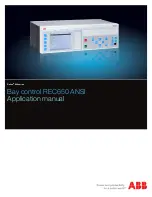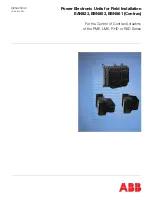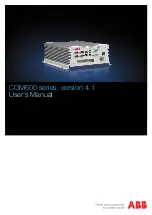
User Information
1
Safety Output-Extension Module TE- OR3
H10
Ver. A
E61-058-00
H. ZANDER GmbH & Co. KG • Am Gut Wolf 15 • 52070 Aachen • Germany
Tel +49 (0)241 9105010 • Fax +49 (0)241 91050138 •
[email protected] • www.zander-aachen.de
Safety
Precaution
•
Low amount of cabling because of driving via TBUS-
loading system
•
LED indicator for status channel 1 and 2
•
Up to PL e, SILCL 3, category 4
Correct Use
TE-OR3(D) is an all-purpose safe output-extension module with
three safe relay-contacts. In combination with basic module
TALOS
®
TB-I14O3, it ensures the quick an safe deactivation of
the moving parts of a machine in case of danger.
TE-OR3(D) extends the safe semiconductor outputs of the basic
module for galvanic isolation and power adjustment.
TE-OR3D is specially designed and certified for the use in
furnaces and ancillary equipment in continuously mode
according to EN 50156-1 and EN 746-2.
Features
•
3 safe, redundant contacts
1 auxiliary contact
•
Extension of the safe semiconductor outputs of the basic
module for galvanic isolation and power adjustment
•
Cyclical self-monitoring
•
Feedback loop can be used for monitoring by previous
basic module (optional)
•
Configurable on each of the safe outputs of the basic
module by setting a jumper at the front of the module
Function
The safe extension module TE-OR3 is designed for safe
isolation of safety circuits according to EN 60204-1 and can
be used up to safety category 4, PL e according to EN ISO
13849-1.
The internal logical system closes the safety contacts when
the safety output of the basic module is switched on.
If the safety output of the basic module is switched off, the
positively driven safety contacts are opened and safely
switch the machine off. It is ensured that a single fault does
not lead to a loss of the safety function and that every fault
is detected by cyclical self-monitoring no later than when
the system is switched off an switched on again.
The use without the basic module is not possible
.
Installation
As per EN60204-1, the device is intended for installation in
control cabinets with a minimum degree of protection of
IP54. There has to be an adequate heat dissipation in the
control cabinet. It is mounted on a 35 mm DIN rail
according to EN 60715 TH35 with a pre-installed TBUS-
terminal. The device has to be mounted on the right side of
the basic module. The device will be connected by the
PCB-connector on its backside with the TBUS-terminal.
Fig. 1 Block diagram TE-OR3(D)
Fig. 2 Mounting / Demounting
Electrical
Connection
•
External fusing of the safety contacts must be provided.
•
The line cross section does not have to exceed 2.5 mm
2
.
•
If the device does not function after commissioning, it
must be returned to the manufacturer unopened.
Opening the device will void the warranty.
Fig. 3 Terminals
O1:
Safety output 1
O2 :
Safety output 2
O3:
Safety output 3
In:
Input control line
13-14:
Safety contact 1
23-24:
Safety contact 2
33-34:
Safety contact 3
41-42:
Auxiliary contact
•
All relevant safety regulations and standards are to be
observed.
•
There have to be the same electrical potential on the
current paths 13-14 and 23-24.
•
The overall concept of the control system in which the
device is incorporated must be validated by the user.
•
Failure to observe the safety regulations can result in
death, serious injury and serious damage.
•
Note down the version of the product (see label “Ver.”)
and check it prior to every commissioning of a new
device. If the version has changed, the overall concept of
the control system in which the device is incorporated
must be validated again by the user.
•
Installation and commissioning of the device must be
performed
only by authorized personnel
.
•
Observe the country-specific regulations when installing
the device.
•
The electrical connection of the device is only allowed to
be made with the device isolated.
•
The wiring of the device must comply with the
instructions in this user information, otherwise there is a
risk that the safety function will be lost.
•
It is not allowed to open the device, tamper with the
device or bypass the safety devices.
Englisch translation






















